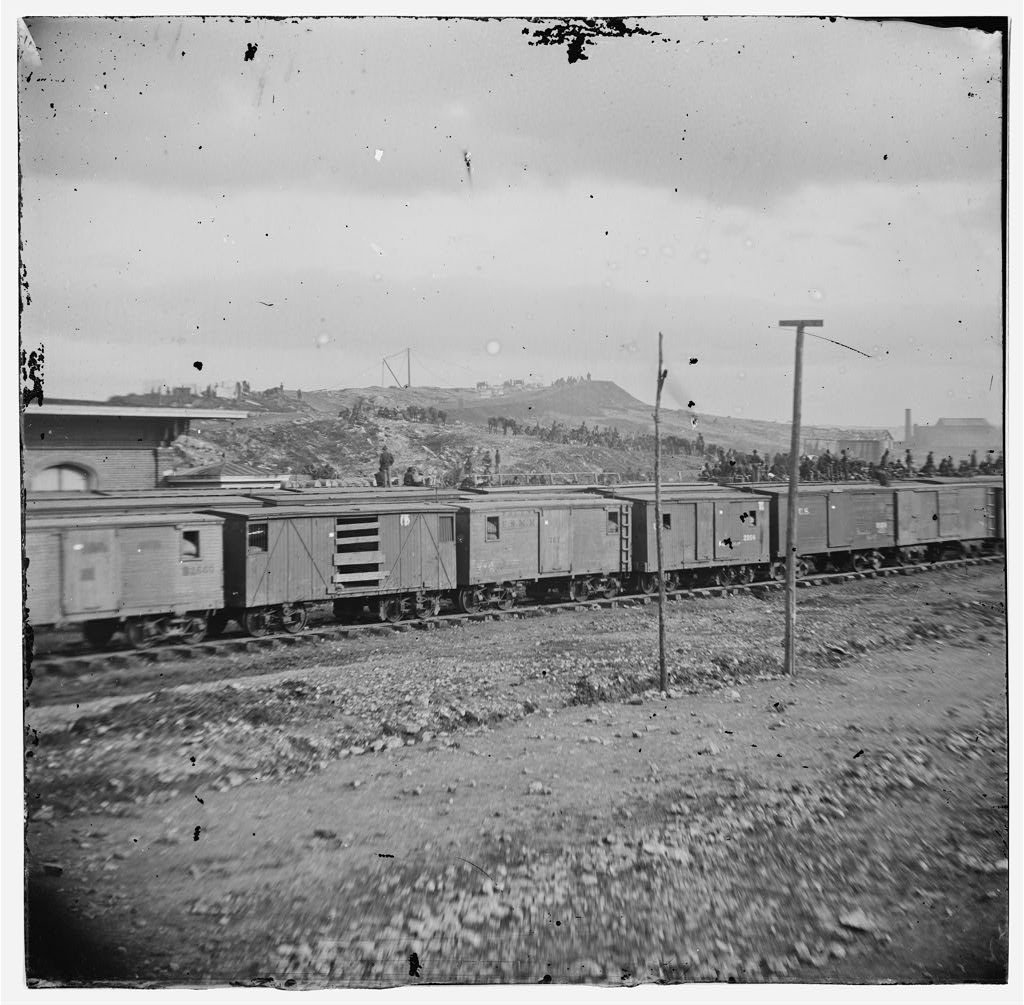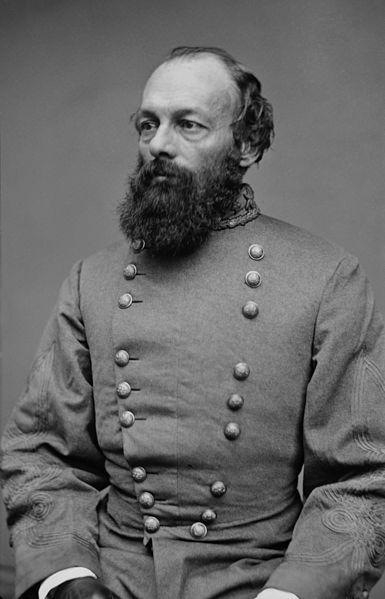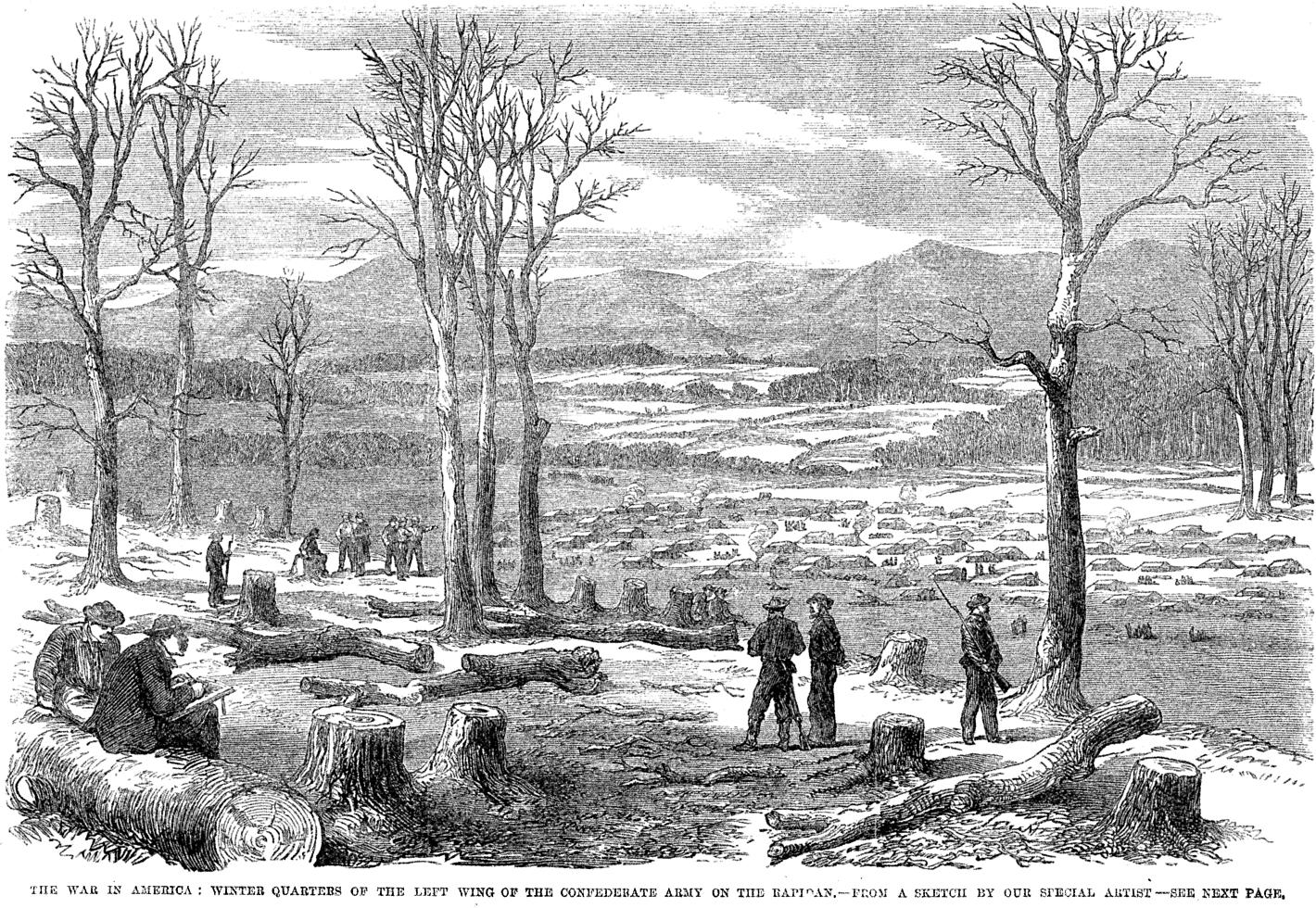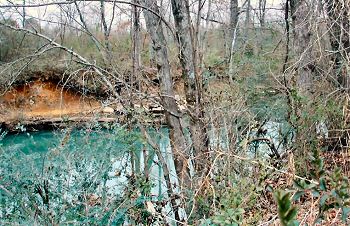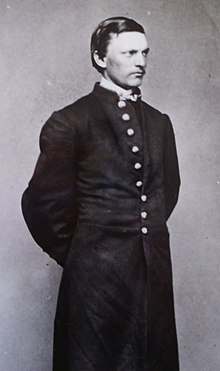 |
First Day at Chickamauga
Map by Hal Jespersen, www.posix.com/CW |
HEADQUARTERS ARMY OF TENNESSEE,
In the Field, Leet's Tan-yard,
September 18, 1863.
1. Johnson's column (Hood's), on crossing at or near Reed's Bridge, will
turn to the left by the most practicable route and sweep up the
Chickamauga, toward Lee and Gordon's Mills.
2. Walker, crossing at Alexander's Bridge, will unite in this move and
push vigorously on the enemy's flank and rear in the same direction.
3. Buckner, crossing at Thedford's Ford, will join in the movement to
the left, and press the enemy up the stream from Polk's front at Lee and
Gordon's Mills.
4. Polk will press his forces to the front of Lee and Gordon's Mills,
and if met by too much resistance to cross will bear to the right and
cross at Dalton's Ford, or at Thedford's, as may be necessary, and join
in the attack wherever the enemy may be.
5. Hill will cover our left flank from an advance of the enemy from the
cove and by pressing the cavalry in his front ascertain if the enemy is
re-enforcing at Lee and Gordon's Mills, in which event he will attack
them in flank.
6. Wheeler's cavalry will hold the gaps in Pigeon Mountain and cover our rear and left and bring up stragglers.
7. All teams, &c., not with troops should go toward Ringgold and
Dalton, beyond Taylor's Ridge. All cooking should be done at the trains.
Rations, when cooked, will be forwarded to the troops.
8. The above movements will be executed with the utmost promptness, vigor, and persistence.
By command of General Bragg:
GEORGE WM. BRENT,
Assistant Adjutant-General.
HEADQUARTERS DEPARTMENT OF THE CUMBERLAND,
Crawfish Spring,
September 18, 1863-9 a.m.
Major General GEORGE H. THOMAS:
GENERAL: Clouds of dust and smoke indicate the enemy's cavalry is moving
in heavy force from Worthen's to Knaper's [Napier's], and are sweeping
around to our left. Have you any news from your front?
Very respectfully, your obedient servant,
J. A. GARFIELD,
Brigadier-General, and Chief of Staff.
HEADQUARTERS ARMY OF TENNESSEE,
In the Field, Leet's Tan-yard,
September 18, 1863.
[General POLK:]
Brigadier General B. R. Johnson, commanding Hood's division, has crossed
at Reed's Bridge, and is now on the west bank of the Chickamauga.
Generals Walker and Buckner have been directed to cross at once and
co-operate with him.
I am, general, your obedient servant,
KINLOCH FALCONER.
Assistant Adjutant-General.
HEADQUARTERS DEPARTMENT OF THE CUMBERLAND, Crawfish Spring,
September 19, 1863-9.50 a.m.
Major General GEORGE H. THOMAS:
Your note of 9.30 is received. The general commanding does not think you
should commit yourself to any considerable movement before we hear from
our extreme left. The rumor that the enemy is between Alexander's and
Reed's bridges can hardly be true. McCook was at the former place last
night, and Colonel Grose's brigade started it that direction nearly two
hours ago. The general commanding directs you to reconnoiter thoroughly
before moving out in force. Meantime get a good position.
Very respectfully, your obedient servant,
J. A. GARFIELD,
Brigadier-General, Chief of Staff.
HEADQUARTERS DEPARTMENT OF THE CUMBERLAND,
Crawfish Spring,
September 18, 1863-10.45 a.m.
Major-General McCOOK:
The general commanding directs you to move your command down the
Chickamauga and close it up compactly on General Thomas' right. The
Fourteenth Army Corps is being drawn this way, and you will close in
upon it in its new position. General Mitchell has been ordered to hold
Stevens' Gap and watch the enemy's movements in the direction of the
gaps of Pigeon Mountain. Hold your command in readiness for any
movement. The enemy appear to be making a demonstration on Crittenden's
left. Reconnoiter well your front.
Very respectfully, your obedient servant,
J. A. GARFIELD,
Brigadier-General, and Chief of Staff.
HEADQUARTERS DEPARTMENT OF THE CUMBERLAND, Widow Glenn's,
September 19, 1863-noon.
Major-General THOMAS,
Commanding Fourteenth Army Corps:
The general commanding desires you to inform him of the general
direction of you line of battle. He suggests that it should be en
echelon in the general direction of northwest and southeast, with your
left hugging the mountain and keeping your right refused. This is based
on the supposition that Bragg has formed a line facing westward, and is
attempting to turn your left by the Ringgold road.
Of course circumstances should modify your position.
J. A. G[ARFIELD].
HDQRS. POLK'S CORPS, ARMY OF TENNESSEE,
Anderson's House, Two Miles from Gordon's Mills,
September 18, 1863-12.30 p. m.
GENERAL: This column found the enemy in some force (not large) a short
distance beyond this point. I am now engaged in deploying my troops and
posting my batteries with a view of pressing him. A few of my batteries
have already opened. A citizen from the other side of the river this
morning reports the presence of five generals (Crittenden, Wood, Van
Cleve, Palmer, and a Dutchman, whose name was not remembered). A staff
officer this morning reports the enemy's column moving down Chickamauga
on the other side in quiet line.
Respectfully, general, your obedient servant,
L. POLK,
Lieutenant-General, Commanding.
Brigadier-General MACKALL.
GLASS' MILL, [
September 18, 1863]- 1 p.m.
General POLK,
Commanding Corps:
GENERAL: I have driven the enemy's pickets across the creek. Citizens
report no movement near here last night. There is an excellent position
for another corps on your left. Its right resting a little below this
place and its left toward Pigeon Ridge, its right would be immediately
on the creek.
I have just captured a prisoner of Palmer's corps, who states that
Thomas' division moved into camp on their right late last night. The
main camp seems to be about opposite Owens' Ford, which is now nearly on
my left. Were General Hill to take position where I have mentioned his
center would cover it.
Respectfully,
F. C. ARMSTRONG,
Brigadier-General.
HEADQUARTERS,
September 18, 1863-2 p.m.
Major General THOMAS L. CRITTENDEN,
Commanding:
GENERAL: My right rests at the point we selected on Sunday last and the
left extends to about one-quarter of a mile east of the Rossville and La
Fayette roads. A brigade and a half of Van Cleve's hold the left of the
line and the remainder is held by my two brigades. I have a small part
of my two brigades in reserve and two regiments of Van Cleve's. General
Palmer should be forced up against my right. The enemy appears to have a
heavy force of infantry opposite my right and center, and the lookouts
from trees report another column or force moving toward our left. He has
just opened on me with artillery for the first time.
Respectfully,
THE. J. WOOD,
Brigadier-General of Volunteers, Commanding.
SEPTEMBER 18, 1863-2.40 p.m.
General GARFIELD:
An order came in my absence for me to close up on Thomas. This moment a
telegram comes to hold myself in readiness. Shall I move or be ready to
move? All quiet on my front and right. General Reynolds wishes to know
where Cook's Mill is.
McCOOK,
Major-General, Commanding.
HEADQUARTERS TWENTIETH ARMY CORPS,
September 18, 1863-2.45 p.m.
General GARFIELD, Chief of Staff:
GENERAL: Your dispatch of 1 p.m. just received. General Lytle, with his
brigades, arrived here last night. His troops are now in position. My
wagon train all came down the mountain this morning. Colonel Post's
brigade is now marching from Winston's to this place. If you wish, I can
direct him to any point on the mountain you may designate. I will await
your order. I think the demonstration on the left is a reconnaissance,
as Wheeler's demonstration yesterday developed nothing. They evidently
saw our movement and are anxious. Thank God we have the wind and dust in
our favor.
Respectfully,
A. McD. McCOOK,
Major-General.
P. S. - I await your order to move up.
A. McD. McC.
CHATTANOOGA AND GORDON'S MILLS ROAD, ONE AND A HALF MILES FROM GORDON'S MILLS,
September 18, 1863-4 p.m.
Colonel GODDARD,
Assistant Adjutant-General, and Chief of Staff:
The enemy are crossing (infantry and cavalry) Chickamauga Creek at
Alexander's and Byram's Ford below. Colonel Minty has fallen back toward
Rossville; has two of my regiments. Colonel Minty reports cannonading
toward Cleveland last night. This forenoon a column of dust arose in
Napier's Gap; three hours in passing. A large camp fire is now seen at
Napier's. The column that attacked me came through Napier's Gap; another
column came from the direction of Peeler's. Colonel Minty reports
infantry flanking him on both flanks.
I am, sir, very respectfully, &c.,
J. T. WILDER,
Colonel, Commanding Brigade.
HEADQUARTERS POLK'S CORPS, ARMY OF TENNESSEE,
Anderson's House,
September 18, 1863-5.40 p. m.
GENERAL: I have pressed down to a point immediately opposite Gordon's
Mills, and find the hills on the other side occupied strongly with
infantry and batteries. The ground on the other side is high and
commanding, and covered with wood. That on this side is low, and
consists of open fields. As Buckner and Cheatham are in possession of
Hunt's and Thedford's Fords, within a short distance below, and I have a
good road into their line of march, I shall continue to threaten this
position and shall pass over below. I am just advised by one of my staff
officers that the column above me was in the act of crossing as he left
it.
Respectfully, general, your obedient servant,
L. POLK,
Lieutenant-General, Commanding.
Brigadier-General MACKALL,
Assistant Adjutant-General.
HEADQUARTERS FOURTEENTH ARMY CORPS,
Crawfish Spring,
September 18, 1863-8 p.m.
Major General JAMES S. NEGLEY,
Commanding Second Division:
GENERAL: As soon as possible push down strong pickets along your whole
front from the Crawfish Creek, on your left, to your right beyond
Matthews' house, or till you connect with the pickets on your right. You
will push them well down to the Chickamauga River, as the enemy are
reported as lodging their pickets in the woods on our side. Much of the
defensible ground is between the road you are on and the river. All the
range there is for artillery consists of the clearing which run from the
river to the ridge tops. They must be held.
GEO. H. THOMAS,
Major-General, U. S. Volunteers, Commanding.
HDQRS. FIRST BRIG., FOURTH DIV., 14TH ARMY CORPS,
Vineyard's, on Chattanooga Road,
September 18, 1863-8.50 p. m.
Colonel GODDARD,
Assistant Adjutant-General:
I send you Mr. McDowell, who lives 3 miles this side of Rossville, and
knows all the roads in this vicinity. The rebels are across Chickamauga,
and are found in force on any of the roads leading to the right, at a
quarter of a mile. They are planting artillery in my front, and our
lines of skirmishers are mixed together. My main line and theirs is not
more than 200 yards apart, and not more than 600 yards from the road
from Gordon's Mills to Chattanooga, 1 1/4 miles from Gordon's Mills.
I have no position for artillery, and if my right is not strengthened,
am in danger of being driven back. They attacked us at dark with cheers,
but were held in check. Their force is nearly all infantry, and from
appearances it is a large one.
I am, very respectfully, yours, &c.,
J. T. WILDER,
Colonel, &c.
Official Record Series I., Vol. 30, Part 1, Pages 66, 73, 107, 108, 112, 114, 118, 240, 416, Vol. 30, Part 2, Pages 46, Vol. 30, Part 3, Pages 725, 726, Part 4, Pages 663, 667,
The battle begins with Confederate forces trying to force a passage at Reed's Bridge. As the day progresses, more troops are fed into the fight on both sides. It stands out that it was readily apparent artillery would not be of great use in the densely forested terrain. Lines were fluid. The presence of the enemy, and their intentions, relatively little known. Although the fighting on the 18th is not nearly as heavy as the violent clash of the next day, the names which would come to fame are already on the scene. Wilder fighting to delay the Confederate crossing. Thomas defending the vulnerable Union left. Hood deploying against the Union left, Polk the right. Also noteworthy is how little communication there is from Rosecrans, who seems to have been unprepared for the battle taking shape. For geographical reference, the Union HQ was at Crawfish Spring's, in what is now the town of Chickamaugua, just south of the battlefield. Leet's Tanyard, the nominal Confederate HQ was south and west of there near Ringold.

